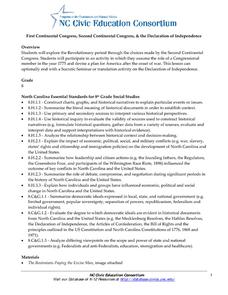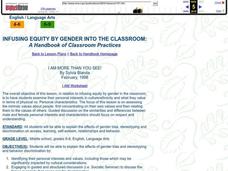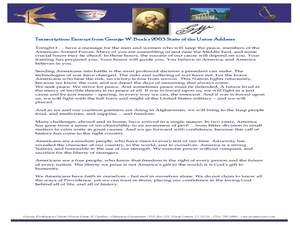EngageNY
Preparation for End of Unit Assessment: Making Connections between Song Lyrics and Texts, Part 1
Song lyrics can help people better understand literary texts. Scholars continue listening to "Ain't Gonna Let Nobody Turn Me Around" and discuss the connections between the song's lyrics and Carlotta Walls LaNier's memoir, A Mighty Long...
EngageNY
Preparation for End of Unit Assessment: Making Connections between Song Lyrics and Texts, Part 2
Five hundred schoolchildren first performed the song "Lift Every Voice and Sing" in 1900 to celebrate President Lincoln's birthday. Scholars listen to the historic song and discuss the lyrics with partners. They continue preparing notes...
EngageNY
End of Unit Assessment: Making Connections between Song Lyrics and Texts
For the end-of-unit assessment, scholars engage in small group Socratic seminars to connect the lyrics of two songs to texts they read and studied. They discuss how the songs "Ain't Gonna Let Nobody Turn Me Around" and "Lift Every Voice...
Smithsonian Institution
Hidden Histories: Mexican Repatriation During the 1930s
Mexican Repatriation: the forgotten deportation of American citizens. The resource focuses on the deportation of Mexican American citizens during the Great Depression. Young historians read documents, complete a free-write, and fill out...
Bonneville
Why Use Renewable Energy?
Renew one's interest in renewable energy sources. Scholars learn about the advantages and disadvantages of various renewable and non-renewable energy sources. They conduct an activity to simulate the greenhouse effect and take part in a...
Virginia Department of Education
Biotechnological Issues and Bioethics
Culminate a bioethics unit with the implementation of a lesson plan that incorporates the Socratic method to encourage class feedback and participation. Pupils participate in a discussion on bioethics and morality, complete a writing...
Constitutional Rights Foundation
Refugees from the Caribbean: Cuban and Haitian “Boat People”
Should refugees fleeing poverty be allowed the same entrance into the United States as those fleeing persecution? High schoolers read about US foreign policy in the late 20th century regarding refugees from Cuba and Haiti, and engage in...
Curated OER
The Gettysburg Address
Who was Abraham Lincoln, and what is the Gettysburg Address? Sixth graders participate in a seminar where they read and analyze the Gettysburg Address and its importance. The role of Abraham Lincoln during the Civil War is also...
Carolina K-12
First Continental Congress, Second Continental Congress, and the Declaration of Independence
Your learners will take on the roles of Congressional members in the year 1775 and devise a plan for America after the onset of the Revolutionary War.
University of the Desert
What Is Extremism?
By participating in discussions using prompts and statements provided in the lesson plan, learners identify the concept of extremism and consider what causes violent acts of extremism in the modern world.
Curated OER
I Am More Than You See
Students discuss the effects of gender bias and stereotyping by identifying personal interests and values. In this sociology lesson, students iscuss the forces in society which cause gender discrimination, create poems about themselves,...
Curated OER
George Washington's Foreign Policy
Students compare George Washington's foreign policy to the policies of presidents who followed him. In this primary source analysis lesson, students compare Washington's Farewell Address to the Roosevelt Corollary, the Monroe Doctrine,...
Curated OER
Japanese Internment During World War II
Students identify, describe and discuss the reasons why Japanese-Americans were placed in internment camps and what life was like at these camps. Then they write an unsent letter to a family member on the East Coast describing their...
Other popular searches
- Antigone Socratic Seminar
- Socratic Seminar Lessons
- Socratic Seminar Math
- Socratic Seminar Science
- Socratic Seminar Civil War
- Math + Socratic Seminar
- Socratic Seminar Teen Living
- Socratic Seminar Mathematics
- Socratic Seminar Slaves
- The Giver, Socratic Seminar
- Socratic Seminar Slavery
- Giver Socratic Seminar














